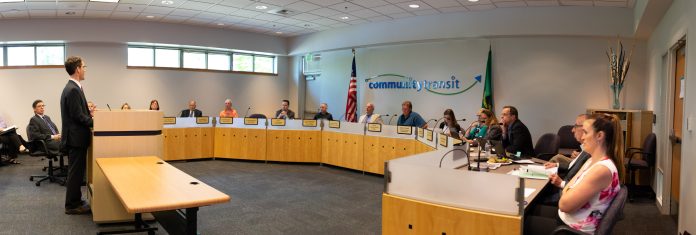
As disabled public transit advocates, we find Covid-19 has made transit board meetings increasingly accessible from the comfort of home–but only for now. For instance, transit boards will let you call in and either give your public comments over the phone or read them into the record. Streaming and call-in options also make it possible to listen to the rest of the public meetings.
The problem is that when Governor Inslee’s courageous Stay Home, Stay Healthy proclamation phases out to Phase 3 or Phase 4, we are concerned that public transit agencies and other governmental bodies may revert to an old mode of operation that denies transit riders a chance to be genuinely heard.
It can be burdensome for us to get to physical locations of meetings because of the long travel times of transit, and this is extra difficult if we have work or caregiving responsibilities. Very few transit staffers and transit board members have a visible disability. It’s also worrisome that in the last recession many transit agencies eliminated their rider committees, a vital tool to have riders speak directly to transit staffs. Furthermore, some transit board members do not or are not able to take public transit on a regular basis and therefore create harmful emissions in the course of their duties.
In short, there is a fundamental difference between those who choose to take public transit and those who rely on public transit, so we speak now to ensure our perspective is included via online meetings.

We ask that online access and participation in our public meetings please continue after the Stay Home, Stay Healthy orders lift please. We also recommend public meetings please adhere to these best practices for remote meetings:
- Have the board receive print copies and upon request also read into the record the first three minutes of public comment submitted.
- Post online board agenda packets, not just the agendas. It’s a simple gesture for more transparency.
- Retain a recording of their meetings and post the recordings online, preferably with the means to provide an automatic transcription.
- Use best practices for online meeting accessibility.
Ultimately, we the disabled community ask with respect: “Nothing about us without us.” All Washingtonians should make the same reasonable demand. Let us be clear: these public meeting reforms will create more inclusion, feedback and participation from community members that have previously been excluded from participating in our public transit’s public processes.



